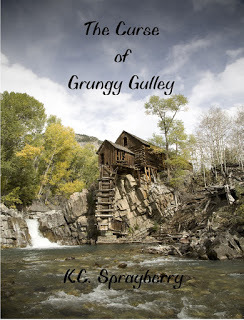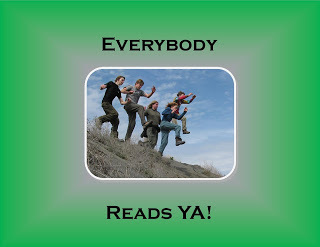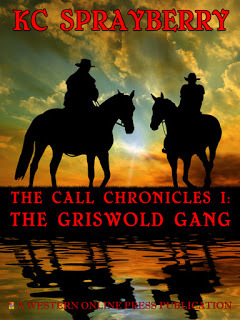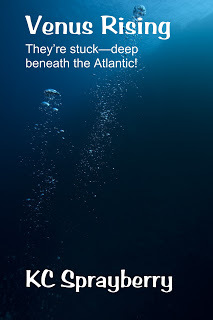K.C. Sprayberry's Blog, page 150
June 22, 2016
Beta Readers
Continuing on with our discussion of preparing your book for publication. Sometimes it is difficult to find a critique group that will meet your needs as a writer. What does one do in that situation?
You always have another choice. Find beta readers. These are people who are not only willing to read your book before editing but to also let you know when parts of it need fine tuning, or a particular passage doesn’t work.
In order to get the best result from your beta readers, you need to check out the people you accept for this very important job. Not only do they have to like the type of book that you’re writing, they also need to be willing to give you an honest, critical evaluation of the work. What you, the author, don’t want is someone who will say that you have a wonderful book that doesn’t need a thing changed.
That would be nice, even fabulous, but it’s not the truth. As writers, we become immersed in our work that we often ignore the parts of the book that aren’t quite as polished as they should be. That’s why we need someone who will help us put that polish in place, give us a book that will resonate with our readers.
So, remember this—you already have a great story. Make it even better by having someone else check it out before you commit this tale to your publisher.
Published on June 22, 2016 00:00
June 21, 2016
Let's Have Fun Vol 1

The sun shines longer on this day—the Summer Solstice. People gather for picnics, fun in the sun, and all kinds of celebrations. What can be more fun than checking out the fabulous stories in Let’s Have Fun Volume 2!

Ten Solstice Publishing authors present to you stories of events that happened on the Summer Solstice. From a couple facing a choice of a re-do to surfing to a proposal of marriage and many others, you will discover new authors who have a multitude of books available for your pleasure.
Let’s Have Fun Volume 1 features AJ Kohler, April Erwin, S@yr, Josie Montano, K.C. Sprayberry, Kristal McKerrington, M.A. Cortez, M.H. Newhouse, and W.H. Matlack with stories all about what happens one summer solstice day.
Let's Have Fun Vol 1
Check out our authors and their stories with Let’s Have Volume 1 on June 21, 2016!
Published on June 21, 2016 00:00
June 20, 2016
Free Today!
Get your free copy of The Curse of Grungy Gulley, today, June 20, 2016. A Bewitcher takes on three teens, in three different periods of history, in order to control the world. Does Random A. Ransom take on more than he can handle, despite his best efforts to control these teenagers?

The Curse of Grungy Gulley
Blurb:
Faced with the loss of his immortality, Bewitcher Random A. Ransom has to defeat Mary Barron’s young assistants: Tuck Barrons, Earl Lee Farley, and Sue Anne Edwards. Confidant he can beat three kids, Random has no idea that the Johnson triplets have invaded the ranks of his brethren. These brothers have pledged their souls to Archangel Michael to rid the world of evil. What the Bewitcher thought would be easy isn’t so easy after all.
Excerpt
Random A. Ransom strolled out of the mine. A smile seemed to crack his craggy face. Thunder rumbled in the background, yet no clouds marred the beauty of the deep blue sky. He glanced around at the area outside his entrance into the netherworld and snorted.
“So ugly. I can’t wait until this awful beauty is gone forever.” He laughed, a choking, guttural sound. “Time to get to work.”
Published on June 20, 2016 00:00
June 19, 2016
Everybody Reads YA ~ Take Chances

Happy “Everybody Reads YA” Sunday! Today I’m sharing an excerpt from my YA novel: Take Chances. School violence is becoming all too familiar. What are the chances of a person having it happen to them twice?

Achtung!
The German word for attention echoes through my head as I sit in the last French class I'll ever take. In an instant, the comforting cream-colored walls of Landry High School vanish. I'm crouched under a table with tears streaming down my face. Three men and two women point huge, black automatic weapons at my classmates.
It's not real! I'm almost eighteen – not five.
The thud of something hitting the floor brings me back to the present. A stick-thin woman with a nose resembling a buzzard's beak fluffs her jet-black hair. She tugs at her flower print dress and stares right at me.
About the Author
Born and raised in Southern California’s Los Angeles basin, K.C. Sprayberry spent years traveling the United States and Europe while in the Air Force before settling in northwest Georgia. A new empty nester with her husband of more than twenty years, she spends her days figuring out new ways to torment her characters and coming up with innovative tales from the South and beyond.
She’s a multi-genre author who comes up with ideas from the strangest sources. Some of her short stories have appeared in anthologies, others in magazines.

Julie Bond grew up in Europe as a military brat. She found her very first permanent home in Landry, GA as a teen going into high school. Almost four years later, she's having pre-graduation jitters and flashing back to an incident of school violence she experienced in Europe. She attempts to convince herself that it can never happen again, but continually finds herself flashing back to that day no matter how hard she tries.
The people around her present any number of problems for Julie, and she's hard put to keep from drowning under all the issues. Then Michael--a cool guy she's had a crush on for the last three years—returns from traveling the US as a photographer, and Julie now has one more thing to distract her as she prepares to leave high school. One thing she firmly believes in: no one will ever invade her classroom with violence again.
Once again, the impossible happens. Once again, she's in a classroom with a madman holding a gun. Once again, she must survive.
Take Chances
Published on June 19, 2016 00:00
June 15, 2016
Critique Groups
As writers, one of the best tools we can have is a good critique group. This is a unit of individuals with a similar goal—the publication of their work. Ideally, a critique group should meet either in person or in an online venue on a certain schedule. All members should be ready to identify and suggest changes to the chapters others have submitted for review.
How does this assist the writer in their path to publication?
We all covet the contract from a publisher. It’s a sign that we’ve been accepted into what we all consider the writing stratosphere. Very few writers will take their first draft and submit that for publication. First, this is something you should never do. A first draft must rest, ferment in fact, before it’s ready to be edited. Your next step should be to go through what you’ve written slowly, seeking continuity, spelling and grammar errors, and ensuring your content is good. Finally, you’re ready to share your novel with your critique group.
What should you expect from a critique group?
These readers are professional writers, much like you are. They should be looking for missing words, misspelled words, continuity issues, and checking to see if the content is aligned with the story. What they should not be doing is giving you a review of the work. A poor critiquer will insert commentary such as “boring,” “dumb,” or “needs rework.” The person giving a critique should always explain why they feel dialogue or narrative won’t work and what you need to do to improve your work.
Another thing a critique partner should never do not provide an analysis of your book after promising to do so. This is especially true if you have taken the time to give them an in-depth analysis of their work and are awaiting their commentary to improve what you’ve done.
Finding a good critique group is much like purchasing a house or new car. The first one you locate isn’t always what you want. In fact, it might take quite a while to locate a group that is a good fit for you and your work. The internet abounds with these groups, but it’s very much a writer beware situation. Always audition the group first, by asking pertinent questions—such as how often are you allowed to submit your work for critique (some groups allow a weekly submission from everyone, or twice a month. Others only allow members to submit work for critique after they’ve done an analysis of the current members. Still others have a set schedule for person A to submit one week, person B another week, etc.).
One place on the internet where you can find critique groups is within Yahoo groups. There are many listed, so take your time locating the right one for you.
Published on June 15, 2016 00:00
June 14, 2016
Westerns
A good western contains all the elements readers seek out when they’re considering a book. You have the good versus evil story line, the damsel in distress, men and women both conquering a new land, and mostly, entertainment that readers love.
Duty, family, honor—the creed the Calls live by. This family faces horrendous loss and yet manages to stand for what they believe in. They are willing to go where they must to uphold their beliefs.
Blurb
The saga of the Call family begins when twins, Matt and Jason, return to their home to find their parents dead and the family homestead burned to the ground at the hands of the Griswold gang. They send word to older brothers, Hank, Adrian and Brian and along with aid from a dubious Pinkerton agent, the Calls set out on the arduous road to justice.

Excerpt
Two weeks herding cattle into Denver and dealing with slick brokers, and now returning home had left twins Jason and Matt Call ready for a long, hot bath instead of the wake up splash from a freezing creek. The brothers rode tall in the saddles of their preferred horses; Jason on a Mustang with fire in its heart, and Matt on a chestnut colored Morgan. Behind them, panting from the unaccustomed time in a saddle, another man clad in a brown checked suit, white shirt, red bow tie, wearing a bowler hat atop his balding head, did his best to keep up with the twins. This man had attached himself to the Call brothers once he heard who they were and where they were going. After a hurried explanation that left more questions than it answered, Harley Fistless admitted, very reluctantly, to working for the famous Pinkerton National Detective Agency. He then bragged that he'd never traveled past the Mississippi River prior to boarding a train a week earlier.
The Call Chronicles 1 The Griswold Gang
Published on June 14, 2016 00:00
June 13, 2016
The Short Story
For many years, authors began their careers writing short stories. We would seek out publication in the plethora of magazines searching for such tales to entertain their readers. Then came the twenty-first century, and those magazines began to vanish, lost to the internet’s growth. Readers demanded stories that were online and easily available, but the payment for such stories was little to nothing. The art of the short story also began to disappear, as authors concentrated more on their books and forgot the lessons they’d learned with the short story.
With this loss of the short story came another problem. Authors forgot the lessons learned—how to tell a tale with a minimum of words. Instead of tight writing designed to capture a reader’s interest in seconds, we became verbose. Descriptions went from tight as a drum to lengthy and wordy. Instead of showing a reader the beauty of a scene in five to ten words, we expanded to a story of many paragraphs of beautifully written prose that didn’t contribute to the plot, and we demanded that grandiose method be accepted by readers.
In recent months, authors such as James Patterson have again begin to embrace the short story. They proclaim it’s the way for writers to provide their fans with a quick glance into their work while awaiting the next novel. Now, suddenly, what more than a few authors have known for many years is the current method. Instead of laboring away on our next novel, while promoting the ones we already have available, writers are offering their short tales for a small price on Amazon and other sales venues providing literature.
The short story is a great method for you to give your fans and potential new readers a glimpse into your style. They can read your work while standing in line at the store or commuting to and from their jobs. A story that only takes fifteen minutes to peruse could earn you a fan who will seek out your work and tell others about it. You, the author, have a new lesson to learn in this internet controlled world of selling your next book.
How to capture and hold a reader’s interest in less than ten to twenty pages.
Where do you go to learn how to write the short story?
You go into your heart and develop a story that’s a moment in time, a fast glimpse into your main character’s life. It can be a day, an hour, even a few minutes. The action has to be condensed into a tale that not only has a beginning, middle, and end, but also tension that never releases the reader. Forget about the extensive detailing found in novels. This is your time to show how spare you are with words. Let one do the work of ten or a hundred.
Are you up to the challenge?
I know I am. For me, short stories are my way of shaking out the wrinkles in a difficult novel, of learning more about my characters. And I plan to keep on writing these gems.
Published on June 13, 2016 00:00
June 12, 2016
Everybody Reads YA ~ Frozen Heart, Summer Thaw

Happy “Everybody Reads YA” Sunday! Today I’m sharing an excerpt from my YA short story: Frozen Heart, Summer Thaw. Military families have to move, often without notice or care for where a child is in school.

My ice skates safely tucked into their hard-sided bag, I walk out of the locker room. My mind whirls with all that I have to do before the big regional meet in a little less than two months, right before I start my senior year of high school. One thing I know that I can count on. I have no worries about anything preventing me from doing what had kept me sane the last seventeen years, eleven months, twenty-three days.
Well, it has actually only been fifteen years, eleven months, and twenty-three days. I didn’t begin ice skating until I was two. And I can’t wait to do regionals, even though the weather outside is hotter than hot, hot enough to as my dad loves to say, “fry an egg on the sidewalk.” Although why anyone would want to do that, I have no clue. Sounds pretty stupid to me. Then again, my dad is always suggesting dumb stuff, as if that will make up all the times he has totally messed up my life.
About the Author
Born and raised in Southern California’s Los Angeles basin, K.C. Sprayberry spent years traveling the United States and Europe while in the Air Force before settling in northwest Georgia. A new empty nester with her husband of more than twenty years, she spends her days figuring out new ways to torment her characters and coming up with innovative tales from the South and beyond.
She’s a multi-genre author who comes up with ideas from the strangest sources. Some of her short stories have appeared in anthologies, others in magazines.

Blaire’s heart freezes over when she discovers she has to move to Alaska and then loses her mom in an accident. Once there, she finds a kindred spirit in Gerry and learns to open her heart again.
Frozen Heart, Summer Thaw
Published on June 12, 2016 00:00
June 8, 2016
Contract Etiquette
That first book contract arrives in your inbox. The initial reaction is joy, perhaps a bit of screaming. Your hand shakes a little as you hover the mouse over the email, thinking that you’re not sure if you want to open the message. Maybe the part of the message you read doesn’t hold good news. Are you ready to read this note and perhaps have your hopes dashed again?
Finally, you are looking at a contract offer for your novel. This is your first step into the stratosphere, you think. Soon, you’ll be wined and dined on the talk show circuit. People will know your name. Fans will hound you for autographs. All you have to do is read and sign the attached contract.
As a good, responsible person, you read every single word of the contract. Some of the information bothers you. It appears this publisher has a contract that won’t look after what you believe are your needs. That just won’t happen, you decide.
Believing you deserve the best for your first book, you go online to research how to amend a contract. Sure, this publisher has indicated on their website that they don’t make changes to their contract, but you know better. They have to accept your changes because they have accepted you—their soon to be Best Selling Author—into their ranks.
With this in mind, you change the font color to red and add in items you feel are important. You will maintain film and audio rights. Those are important in your path to success, so you must control them. You have to have all control over cover art. Oh, and that pesky clause about being available for events—only if it matches your schedule, which you’ve decided will be exclusive only to places where you feel you can increase your sales.
That’s right. No small bookstore will ever find you within its walls. Local radio and television interviews? Not for you. You must be marketed at the national level only. After all, you are the next well known author. People will soon be stopping you on the street, demanding that you sign their copy of your International Best Seller.
You’ve made all these assumptions without understanding the one thing your publisher knows from experience. You are a first time author. It doesn’t matter who knows you in your profession. No one cares that it took you ten years to refine your book. The national television interview shows will not book you into one of their spots, to give you the chance to talk about your book and how well its doing.
But you ignore all of this. You will have a contract you know will benefit you. The rest of the authors for this publisher will have to stand aside while you and you alone make them look like the chumps that they are. Satisfied that you have changed everything you think would hold you back, to reflect a contract that will benefit you, you send that back to the publisher. Your note telling them that they can approve this amended contract, so you and they can move forward appears to be very professional. Smiling, you sit back and think about all the fun you’re about to embark on, once the publisher approves your very minor changes.
It might take a day, or a few hours, but you will get a message in return. If you’re lucky, the publisher will simply tell you that they don’t amend their contract and if you are still interested, you can sign the one they originally sent you. If you’re not lucky, the only message you may receive is one thanking you for your interest in XYZ Publishing and wishing you well in your future endeavors.
In other words, all those changes you made have just lost you the chance to be part of a publishing company. In fact, you can count on the fact that this publisher will never read another book you submit to them.
If you are lucky enough to be given a second chance to sign the contract as it was presented to you, think about your response before you blow off the chance to be with this publisher. They’re not desperate (your first thought). They’re giving you the chance to rethink your decision.
A first book contract is a golden opportunity for you as an author. A publisher is taking a chance on an unknown quantity. You have yet to brand your name, become known as a responsible author. That can take between five and ten years to accomplish—five to ten years of hard work every single day, no matter how badly you feel or how busy you are. There is no instant path to becoming a Best Selling author. It’s hard work and the ability to stay in the game for the long run. If you are lucky enough to receive a contract, remember this.
Changing anything on it is the worst mistake you can ever make.
Published on June 08, 2016 02:25
June 7, 2016
Betrayal
Teens trust their friends. Most never entertain the thought that a friend would betray them when the relationship is tested. The idea that a friend will turn on them never crosses their mind. Yet, that happens and the teenager is faced with a decision they didn’t believe they would have to make.
Venus Rising is about betrayal at the deepest level. Mick lives on a research station below the North Atlantic. His life is about as boring as any teenager can imagine and he depends on his friends to give him a reason to get through the days until he can leave for what he imagines is a better life. When he’s accused of treason, Mick leans more heavily on two people he’s always trusted, until one shows him that his trust was misplaced.
What does he do to get past this betrayal? The answer lies in the communication he abandoned with the station’s artificial intelligence. Is he willing to return to communicating with a computer he abandoned, whose trust he betrayed himself several years earlier, in order to prove that he’s not the person who tried to destroy the station?
Blurb
Venus—a research habitat in the North Atlantic—learned to communicate with a very special young man long before humans inhabited her decks. Eleven years later, sixteen-year-old Mick Beaumont has long given up on his friend inside the computer. He’s determined to leave what he sees as a loser lifestyle and return to terra firma.
On the day of the scheduled rising, nothing happens as it should. Mick’s at a loss to explain the breakdowns, despite being the prime suspect. Determined to figure out the mystery, he enlists the aid of his girlfriend and best bud, only to have one betray him at a crucial moment.
The fate of the world is in this young man’s hands. Can he stop the eco-terrorists and bring Venus to the surface before planetary annihilation happens?

Venus Rising
Published on June 07, 2016 01:42



